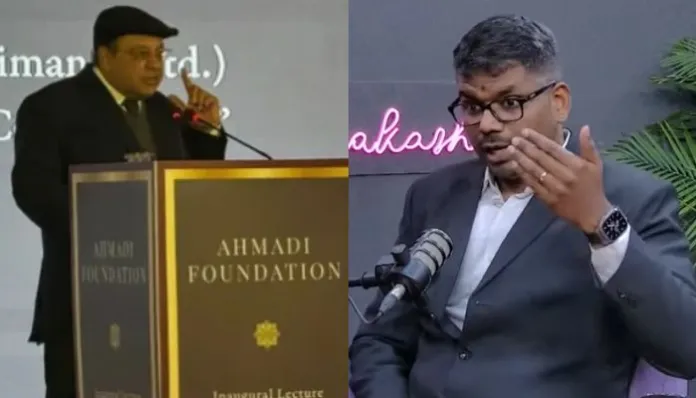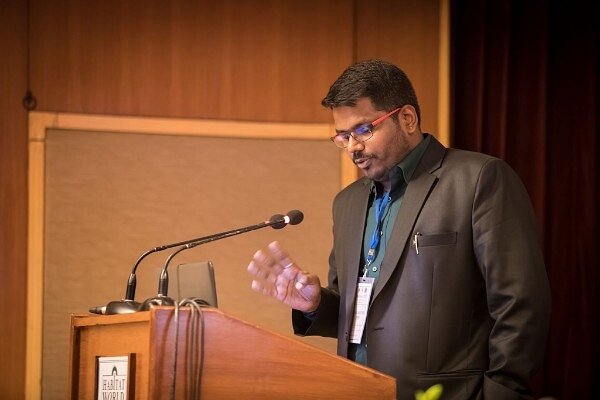
Table of Contents

J Sai Deepak released a statement regarding the Ram Mandir verdict delivered by the Supreme Court of India in 2019 was one of the most significant legal judgments in the country’s history. The case, which dealt with the long-standing dispute over the Babri Masjid and the Ram Janmabhoomi site in Ayodhya, was resolved with the court ruling in favor of building a temple at the disputed site. However, the decision did not go without its fair share of critiques, particularly from legal experts and former judges, including Justice (Retd.) Fali S. Nariman.
Nariman, a distinguished former judge of the Supreme Court, has been vocal in his criticisms of the verdict, raising concerns over its legal reasoning and implications. His critique, however, was met with a sharp response from J Sai Deepak, an eminent lawyer and constitutional expert, who vigorously debunked some of the claims made by the former judge. In this blog, we will explore five key points in which J Sai Deepak challenged Justice Nariman’s comments, providing a compelling counter-narrative that upholds the sanctity of the Ram Mandir verdict.
1. The Concept of Faith and Belief in Legal Framework
One of the key criticisms by Justice Nariman focused on the role of faith and belief in the Ram Mandir verdict. He argued that the court, by considering faith as a central element in its judgment, was venturing into territory that should be reserved for religious institutions and not for the judiciary. Nariman believed that the judiciary’s job should be purely based on evidence, and faith should not have any legal standing in such matters.
However, J Sai Deepak strongly disagrees with this view. He contended that the Indian Constitution recognizes the importance of belief and faith in religious matters, especially in a diverse country like India, where religion plays a pivotal role in shaping the identity of individuals and communities. Deepak pointed out that the Constitution’s preamble itself promises justice not just on the basis of legality but also on the principles of social, economic, and cultural justice—which includes respecting religious beliefs.
Deepak emphasized that the Ram Mandir case was not merely about physical land but was intricately tied to the religious sentiments of millions of Hindus. Asserting that faith cannot be dismissed entirely in legal matters, he argued that the Supreme Court was right in considering the historical and religious significance of the Ram Janmabhoomi site.
2. Historical Evidence and Archaeological Findings
Another significant point of contention between Justice Nariman and J Sai Deepak centers around the weight given to historical evidence and archaeological findings in the verdict. Justice Nariman was critical of the way the Supreme Court treated the archaeological evidence and its role in the final judgment. Nariman believed that the court’s reliance on the findings of the Archaeological Survey of India (ASI) was not entirely warranted and that these findings did not conclusively prove the existence of a temple at the disputed site.
J Sai Deepak, on the other hand, argues that the archaeological evidence presented in the case was both substantial and significant in establishing the existence of a Hindu structure beneath the Babri Masjid. He pointed out that the ASI’s excavations revealed clear architectural remnants consistent with the style of Hindu temple construction from ancient times, and these findings corroborated the belief that the site was historically associated with Hindu worship.
Moreover, Deepak emphasized that the court’s reliance on archaeological evidence was not merely about proving the existence of a temple but was also a way of highlighting the cultural continuity of the site. He argued that the findings were instrumental in understanding the historical importance of the location, which was central to the case.
3. The Question of Legal Ownership vs. Faith
Justice Nariman raised the issue of the legal ownership of the disputed land, arguing that the court should have exclusively based its decision on the legal principles of property rights, rather than considering the religious significance of the site. He suggested that the dispute should have been resolved solely based on ownership and possession, rather than blending it with faith-based arguments.
J Sai Deepak responded by highlighting the unique nature of the Ram Mandir case, where the question of legal ownership was intertwined with centuries of religious and historical narratives. Deepak pointed out that this was not a typical property dispute but rather a complex issue involving cultural identity, religious sentiments, and historical injustice. The case had deep roots in India’s collective memory, and it could not be resolved purely on the basis of ownership or property law, as Nariman suggested.
Deepak reinforced that the Supreme Court had to consider not just the ownership of the land, but also the broader public interest and the historical context of the dispute. He argued that the court’s decision to allow the construction of a Ram Mandir at the site was a way of acknowledging centuries of faith-based claims to the land, which had been ignored by previous legal systems and rulings.
4. The Political and Social Ramifications
Justice Nariman expressed concern that the Ram Mandir verdict could have political ramifications, suggesting that the judgment was influenced by the broader political context surrounding the case, especially given the presence of the BJP and other political groups who had been advocating for the construction of the temple.
J Sai Deepak, however, dismissed this notion, asserting that the court’s decision was based on legal reasoning and was not politically motivated. He argued that the Indian judiciary had maintained its independence and impartiality throughout the case, ensuring that the decision was based solely on facts, evidence, and legal principles.
Deepak also pointed out that justice and legal interpretation cannot always be separated from the socio-political realities of a country, especially in cases involving deeply entrenched religious sentiments. While acknowledging that the case had political undertones, he emphasized that the judgment was a legal resolution to a matter that had been ongoing for centuries and had a direct impact on millions of people’s lives.
5. The Significance of Judicial Independence
Finally, one of the most fundamental disagreements between Justice Nariman and J Sai Deepak revolves around the role of judicial independence. Nariman seemed to suggest that the Supreme Court’s judgment in favor of the Ram Mandir construction was influenced by public opinion or political pressure, potentially undermining the integrity of the judiciary.
J Sai Deepak, however, strongly defended the independence of the judiciary, stating that the Supreme Court took the decision with due diligence, carefully considering all aspects of the case. He underscored that the Indian judiciary, despite facing political pressure at times, had consistently upheld the rule of law and delivered impartial judgments. According to Deepak, the Ram Mandir verdict was a reflection of judicial responsibility, showing the court’s ability to navigate complex, multifaceted issues with fairness and justice.
Conclusion: A Legal Milestone Amidst Complexities
The Ram Mandir verdict is a landmark judgment that has had a profound impact on India’s legal, social, and religious landscape. While it has faced criticism from some quarters, including former Judge Nariman, J Sai Deepak’s defense of the verdict highlights the legal rationale behind the decision. By debunking Nariman’s criticisms, Deepak has provided a robust argument that underscores the legal, historical, and cultural dimensions of the case.
The case not only highlights the role of the judiciary in resolving complex issues but also serves as a reminder of the need to balance legal principles with the diverse cultural and religious fabric of India. As the Ram Mandir stands poised to be built, it represents more than just a legal victory; it is a symbol of faith, justice, and reconciliation in a country that has long struggled with the intersection of religion and law.

For more interesting stories: Rahul Gandhi’s Recent Violence Allegations: A Controversy That Shocks the Nation | 5 Key Points J Sai Deepak Debunks in Ex-Judge Nariman’s Critique of the Ram Mandir Verdict |



